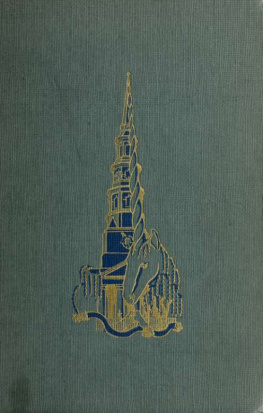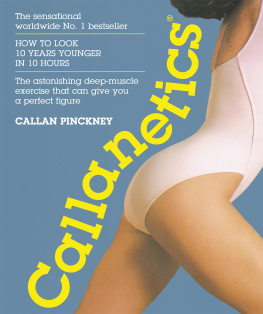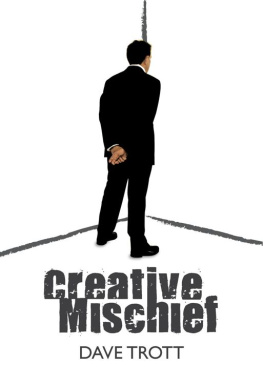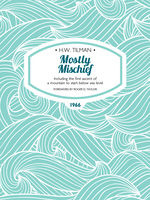Josephine Pinckney - Great Mischief
Here you can read online Josephine Pinckney - Great Mischief full text of the book (entire story) in english for free. Download pdf and epub, get meaning, cover and reviews about this ebook. year: 1948, publisher: Viking, genre: Detective and thriller. Description of the work, (preface) as well as reviews are available. Best literature library LitArk.com created for fans of good reading and offers a wide selection of genres:
Romance novel
Science fiction
Adventure
Detective
Science
History
Home and family
Prose
Art
Politics
Computer
Non-fiction
Religion
Business
Children
Humor
Choose a favorite category and find really read worthwhile books. Enjoy immersion in the world of imagination, feel the emotions of the characters or learn something new for yourself, make an fascinating discovery.
- Book:Great Mischief
- Author:
- Publisher:Viking
- Genre:
- Year:1948
- Rating:3 / 5
- Favourites:Add to favourites
- Your mark:
- 60
- 1
- 2
- 3
- 4
- 5
Great Mischief: summary, description and annotation
We offer to read an annotation, description, summary or preface (depends on what the author of the book "Great Mischief" wrote himself). If you haven't found the necessary information about the book — write in the comments, we will try to find it.
Great Mischief — read online for free the complete book (whole text) full work
Below is the text of the book, divided by pages. System saving the place of the last page read, allows you to conveniently read the book "Great Mischief" online for free, without having to search again every time where you left off. Put a bookmark, and you can go to the page where you finished reading at any time.
Font size:
Interval:
Bookmark:


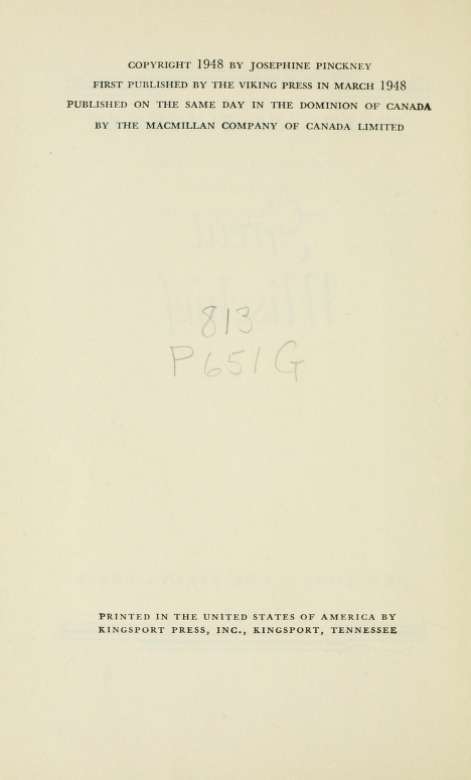
Part One
TOWARD the end of the last century, a time already remote enough to make fables seem possible yet near enough our day to share its commonplaces, a druggist by the name of Timothy Partridge kept a modest shop, too modestly tucked away in a narrow side street. The thirty-sixth year of his life doubtless appeared to him as humdrum and unremarkable as this of ours, except that Partridge, in a more credulous age, was a believer in the remarkable. Being a trained pharmacist, he believed in the marvels of science and in what he could see, smell, and weigh on his brass scales; but he also believed in realities not measured in drams and scruples, including the strict doctrines of his Church and other matters less pleasing to orthodoxy.
An evening in winter with a sodden rain falling seemed a time for dealing with what is generally considered factual. A thin gas pipe descended from the ceiling into the middle of Partridge's Pharmacy and turned up in a hook at the end, on which the unshaded jet, lighted thus early, swung impaled. It hung there like a friendly, bogus serpent hissing against the literal plunk of water striking the paving stones outside, and it partly illumined the shop lined with reposeful rows of jars. It also revealed in part, the top part, Timothy himself in his mohair sack coat. His nether limbs in the great blot of shadow cast by the stove he sat hugging might have been those of fish, beast, or human for all the jet disclosed.
The sack coat, though it was Timothy's daily dress in the shop, hung with a vaguely accidental look from his narrow shoulders which managed to convey through the cloth a distinction deserving of more sumptuary covering. The light struck the back of his head bent over his reading; his hair, worn long, almost to his collar, was thick and stiff and of fine raven black. Hair, bones, and coat, taken together, suggested a naturally extravagant mind within severely clipped by the sharp blades of circumstance.
The pharmaceutical journal in his hand carried accounts of rare drugs, discoveries that gave promise of eliminating some of the ancient scourges of mankind, but the heartening news brought no elation to Timothy. He studied the price list and clucked, he glanced about the drowsing shop and shook his head, he thought of the numerous people who had calls on his generosity because they were poor or relatives or both, or because they had performed special services for the late Confederacy, still an actuality to the faithful in these latitudes. Thus it was that the pharmacy ran on a shoestring; besides, as his sister Penelope always said, "It's wrong to make money out of people's afflictions."
This saying of Penelope's came up through the page Timothy held and overlay the print. She was six years older than he, and her opinions had a way of following him about, of rearing up like a signpost when the road forked and gently pointing out the right way. Bustled along by her conviction, he usually found the right way easier to take than the primrose path; her rich, warm voice persuaded him to rightness; yet feeling her ardent and personable presence beside his rocking chair, he stirred, rattled his journal fretfully, and bethought him that he was chilly.
Through the isinglass panes in the fat paunch of the stove, he saw that the coals had indeed burned low. He opened the little door, decided against putting on more coal for the present, and blew a hopeful gust with the bellows. The embers obliged him by sending a red glow through the aperture. His legs, now withdrawn from the shadow, proved to be quite ordinary, thinnish legs and terminated in feet comfortably snubbed into carpet slippers. But the ruddy shaft slanting from below caught his face and shoulders in a half-satanic light. It threw into relief the mournful descending curve of his mustache; it reddened his oval jaw, and his eyes under his high shining forehead sent back into the depths an answering glare. Bent toward the opening, he seemed to be invoking the Pit.
After a while he closed the stove door and sat back,
relaxed in his rocker. He glanced idly toward the windows; seen under the weak and sallow gas jet, his face had nothing of Satan about it. It was the face of a good man, bewhiskered in the prevailing fashion, enjoying in the cosy cave of his shop an hour of unexpected quiet, vouchsafed him by the kind gods of the weather who were keeping people at home with this drumming rain. The rows and rows of bottles created a sense of order in life; in the front windows the great glass jars of green and amber liquid jeweled his surroundings at small expense. Beyond them the street was deep blue and empty, the color of space itself.
Suddenly Timothy caught a glimpse of a large black sphere flying past, as if a dark planet whirling on its course had shone for a moment in the reflected light from the shop window. It flashed again in the second window, but at the door it halted and pressed against the glass panes, collapsed to a narrow wedge, and on the instant the shop bell jangled as the door sprang open and a young woman stood inside the threshold. The long cloak thrown round her swept the rainy outdoors into the security of the shop. Water poured from the folds of her black cotton umbrella and ran in a tiny dark stream along the floor.
Timothy put on the spectacles he wore largely because of the magian dignity they lent him, and said, "Good evening, ma'am," in a voice from which ran a like trickle of surprise. As the girl stood and stared at him without speaking, he got up and went behind the counter, adding, "Come in out of the wetand close the door, if you please."
Without shifting her scrutiny of him she reached one hand behind her and swung the door to; the bell fastened to it jangled again as it slammed. Bad-mannered piece! said Timothy to himself. Utter want of consideration.... The girl's unfriendly eyes left him and went round the shop, searching it from the frieze of little Gothic arches that framed the top shelf to the heavy mortars and the big stone jars lined up on the floor. When she had finished her deliberate inventory she came up to the counter.
"I want a jar of solanuma large jar."
Her voice was challenging, like the ring of a coin on the counter. Unsuitable, thought Timothy, who had old-fashioned views about women and soft speech almost discordant.
"Have you the prescription?" Mechanically he adopted her abrupt address, thinking: Bad manners are as catching as measles.
She hesitated, then brought from under her cloak a crocheted purse, a cylinder of faded silk. She felt the lean mesh and shook her head. "I must have left it at home."
"Well... solanum is a pretty powerful drug," he said kindly. "I don't like to mix it without a physician's order."
"It's for my fatherhe has a bad earache. You don't need a prescription. And you surely can't expect me to go all the way home to get itin this weather."
She stared through the shop window at the rain drenching off the eaves and making a thick silver fringe where the light caught it. Timothy took a good look at her over his glasses. She had never been in the shop, he was sure, nor could he remember having seen her about the town. But then he was not observant of people; he was a little nearsighted, he frowned down on the pavement when he walked; his thinking and his curiosity were bounded by the shop and his reading. So he might have passed her on the streetthough she had a crispness about her you didn't easily forget. He suddenly saw that she was small; the long cloak and her commanding manner had given him a deceptive impression of height when she stood at the door. Damp ringlets straggled wispily from the scarf tied under her chin.
Font size:
Interval:
Bookmark:
Similar books «Great Mischief»
Look at similar books to Great Mischief. We have selected literature similar in name and meaning in the hope of providing readers with more options to find new, interesting, not yet read works.
Discussion, reviews of the book Great Mischief and just readers' own opinions. Leave your comments, write what you think about the work, its meaning or the main characters. Specify what exactly you liked and what you didn't like, and why you think so.

